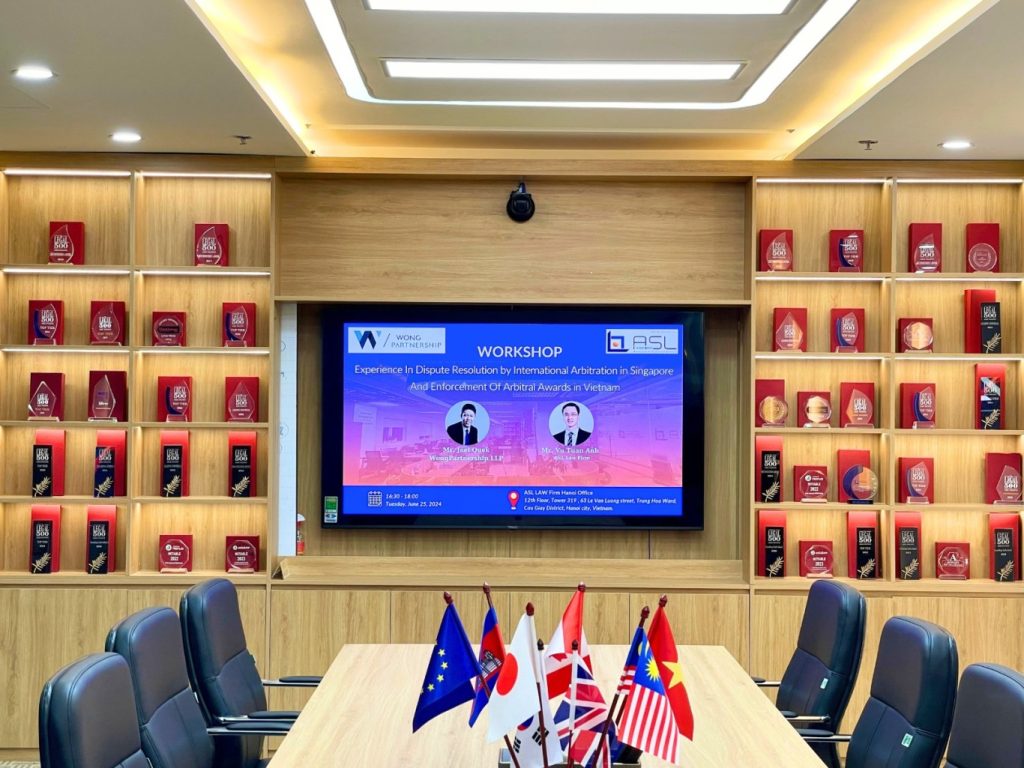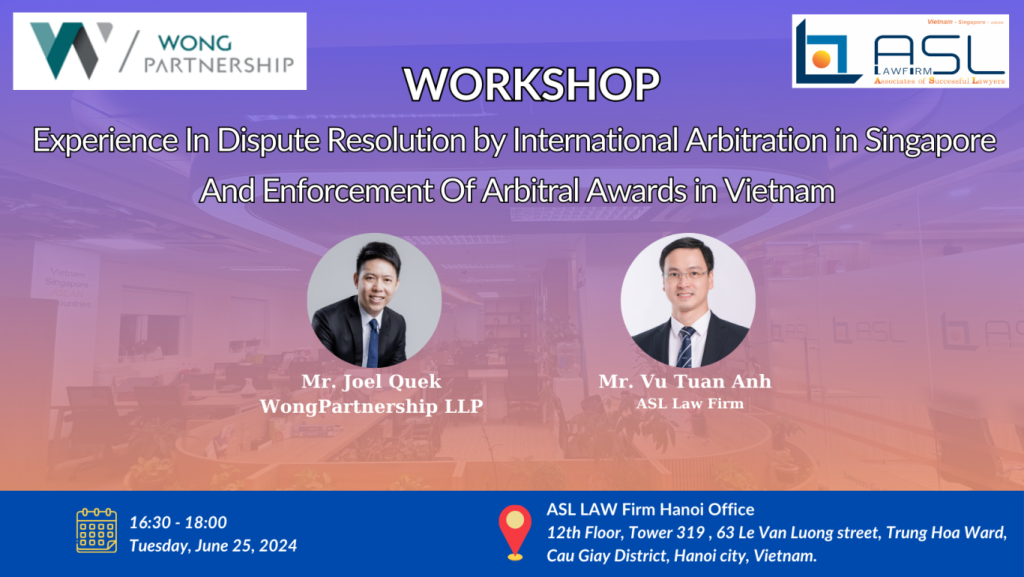In the context of deepening international integration, resolving cross-border commercial disputes through international arbitration has become more common than ever. However, not all foreign arbitral awards are recognized and enforced in Vietnam.
Non-recognition and non-enforcement of foreign awards not only affect the rights of the parties involved but also create complex legal and commercial barriers. In this article, we will explore the 5 main cases that lead to non-recognition and non-enforcement of foreign arbitral awards in Vietnam, as presented by expert Vu Tuan Anh from ASL LAW at the seminar “Experience In Dispute Resolution By International Arbitration In Singapore And Enforcement Of Arbitral Award In Vietnam“, to provide a clearer understanding of current legal regulations and to protect the rights of parties in international commercial disputes.

Main Reasons Leading to Non-Recognition and Non-Enforcement of Foreign Arbitral Awards in Vietnam
5 main cases that are the reasons for the non-recognition and non-enforcement of foreign awards in Vietnam includes:
Case 1: Unauthorized Signatory
According to Decision No. 01/2017/QĐKDTM-ST of the People’s Court of Can Tho City, the signatory (Ms. Truong Hong Thanh Ph) was not qualified to sign the Arbitration Agreement.
As per Point 2, Article 3 of Resolution No. 01 dated March 20, 2014, of the Council of Judges of the Supreme People’s Court guiding the Commercial Arbitration Law, if the arbitration agreement is concluded by an unauthorized person, it will be invalid.
According to Point 1a, Article 459 of the Civil Procedure Code 2015, the arbitration award of the Swiss Arbitration Organization will not be recognized and enforced in Vietnam.
This situation arises when the signatory of the judgment or award does not have the legal authority to do so. Incorrect identification of the authorized person results in the judgment being legally invalid in Vietnam.
Case 2: Improper Notification
According to Decision No. 02/2017/QĐKDTM-ST of the People’s Court of Nam Dinh Province, the documents sent by the International Cotton Association and the Arbitration Council to Company N were not confirmed or acknowledged by any representative of Company N.
Therefore, it can be concluded that Company N did not receive the documents from Company G and the arbitrators, thus not being timely and legally notified of the arbitrator appointment and dispute resolution procedures.

Notification about the judgment must strictly adhere to regulations regarding time limits and methods. If the involved parties do not receive proper notification, the judgment will be considered invalid.
Case 3: Arbitration Authority Exceeded Jurisdiction
According to Decision No. 01/2019/QĐKDTM-ST of the People’s Court of Binh Phuoc Province, CENTA (the Arbitration Center under the Seed Trade Association) should handle the case, but arbitrator TNA conducted arbitration based on an agreement signed in 2016. Therefore, the arbitration content exceeded its jurisdiction and did not conform to the agreed contract terms.
This situation occurs when the arbitration authority exceeds its mandate. If the arbitration body is not legally designated to resolve the dispute, its award will not be recognized.
Case 4: Improper Arbitration Procedures
According to Decision No. 01/2019/QĐKDTM-ST of the People’s Court of Binh Phuoc Province, the Arbitration Council did not send necessary documents, including the arbitration request, arbitration notice, arbitrator list, arbitration rules, arbitrator selection form, and notice of the arbitration hearing. This indicates that the composition of the Arbitration Council and the dispute resolution process did not comply with regulations.
Arbitration procedures must strictly follow legal regulations. If the arbitration authority violates these regulations, the judgment will be reviewed and possibly not enforced.
Case 5: Judgment Contradicts Basic Principles of Vietnamese Law
According to Decision No. 52/2017/QĐDS-ST of the People’s Court of Kien Giang Province, the judgment of the U.S. court regarding the division of real estate assets located in Vietnam did not comply with the basic principles of Vietnamese law, as real estate located in Vietnam falls under the exclusive jurisdiction of Vietnamese courts.
Vietnam and the U.S. have not signed any international agreements, nor are both parties members of any international convention on recognizing and enforcing judgments related to real estate located in member countries.
This situation arises when the arbitration award conflicts with the fundamental principles of Vietnamese law, which can include infringing upon the legal rights and interests of the involved parties.

The seminar not only helped delegates understand the international arbitration process, particularly in Singapore, but also grasp the necessary steps to protect their rights in international commercial disputes. Understanding the cases of non-recognition and non-enforcement of foreign judgments in Vietnam is crucial to ensure the rights of parties involved in cross-border commercial disputes.
ASL Law is a leading full-service and independent Vietnamese law firm made up of experienced and talented lawyers. ASL Law is ranked as the top tier Law Firm in Vietnam by Legal500, Asia Law, WTR, and Asia Business Law Journal. Based in both Hanoi and Ho Chi Minh City in Vietnam, the firm’s main purpose is to provide the most practical, efficient and lawful advice to its domestic and international clients. If we can be of assistance, please email to [email protected].
ASL LAW is the top-tier Vietnam law firm for litigation and dispute resolution. If you need any advice, please contact us for further information or collaboration.

 Tiếng Việt
Tiếng Việt 中文 (中国)
中文 (中国) 日本語
日本語

